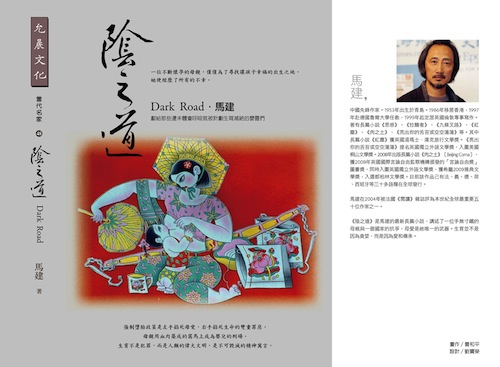No Place for Incarnation?
by Tienchi Martin-Liao / June 6, 2012 / No comments
Ma Jian’s Dark Road: a new book on China’s one-child policy.
The Chinese “one-child policy” has been implemented for three decades, and one proud official report estimates that 300 million newborns have been prevented since the policy was implemented.

- During the Cultural Revolution, people were sentenced to death or outright murdered because of one wrong sentence. In China today writers do not lose their lives over their poems or articles; however, they are jailed for years. My friend Liu Xiaobo for example will stay in prison till 2020; even winning the Nobel Peace Prize could not help him. In prison those lucky enough not to be sentenced to hard labor play “blind chess” to kill time AND TO TRAIN THE BRAIN NOT TO RUST. Freedom of expression is still a luxury in China. The firewall is everywhere, yet words can fly above it and so can our thoughts. My column, like the blind chess played by prisoners, is an exercise to keep our brains from rusting and the situation in China from indifference.

- Tienchi Martin-Liao is the president of the Independent Chinese PEN Center. Previously she worked at the Institute for Asian Affairs in Hamburg, Germany, and lectured at the Ruhr-University Bochum from 1985 to 1991. She became head of the Richard-Wilhelm Research Center for Translation in 1991 until she took a job in 2001 as director of the Laogai Research Foundation (LRF) to work on human rights issues. She was at LRF until 2009. Martin-Liao has served as deputy director of the affiliated China Information Center and was responsible for updating the Laogai Handbook and working on the Black Series, autobiographies of Chinese political prisoners and other human rights books. She was elected president of the Independent Chinese PEN Center in October 2009 and has daily contact with online journalists in China.
How did that happen? Forced abortion and sterilization, economic penalties, demolition of homes, and detention of the husband or other family members. A woman with a second pregnancy is a criminal in China because the “family planning policy” has been written into the constitution. An officer of the Committee of the Family Planning has the duty and the right to uphold the law. As a result the blind lawyer Chen Guangcheng, who tried to protect victims of the law—pregnant women and their unborn babies— is treated as an enemy of the state. Weeks ago, after a legendary escape, Chen arrived in the U.S. and started his law studies at New York University. Would the discrepancy between Chinese and American law in terms of maternity and unborn lives be a great cultural shock for him?
Ma Jian, the London-based award-winning author of Beijing Coma (2008), has recently published his novel Yin Zhi Dao (Dark Road, Yunchen Publishing House, Taipei, 2012). Ma Jian spent years traveling around China to talk with women who want, but are not allowed, to give birth. As a father of four children, it is hard for him to write down the bloodcurdling stories of how millions of babies are killed in name of law and order in his home country.
The novel Dark Road is an absurd story about a couple, Kong Lao’er, a descendant of Confucius, and a common peasant woman who have to hide themselves in the most bizarre places in southern China—first in a boat, and later in a town’s dumpsite for electronics—in order to give birth to their second child. The woman is caught and forced to have an abortion by the authorities. Later she becomes pregnant again, yet at the due time, the baby, named Paradise, refuses to come out of the uterus. Five years pass, and when the family’s only daughter disappears mysteriously, baby Paradise arrives.
The book title, Yin Zhi Dao (Dark Road), also means vagina, or place of life and origin. Ma Jian applies magical realism to describe the perverse reality in China. Between the magical element and the reality, the readers experience the true human tragedy. Neither God nor nature determines human lives; instead it is the State and ignorant officers. “As long as you have a vagina in your trousers, no matter where you are, it will be checked. Men want your vagina, the authority controls your uterus. You cannot lock it up, they have the key. We females can’t escape our fate,” says one female character to another. The fear is immanent and well-founded, “Should one family have more than one child, the whole village will be sterilized.” This is the official slogan in reality, and it has been carried out with iron fist.
Eventually the protagonist of the novel, Kong, who symbolizes the good old Chinese traditions, has to go into exile in his home country. There is no place for the new baby’s incarnation, yet “Paradise” insists on its arrival into a world that its mother has called “hell.” What kind of future is awaiting the mother and her baby?
With colorful language and metaphors, the author shares a couple’s unbalanced fight against the cold-blooded policy that is made not to protect, but to destroy, lives.
The English version of Dark Road will be published in the U.S. by Penguin at the end of the year.





